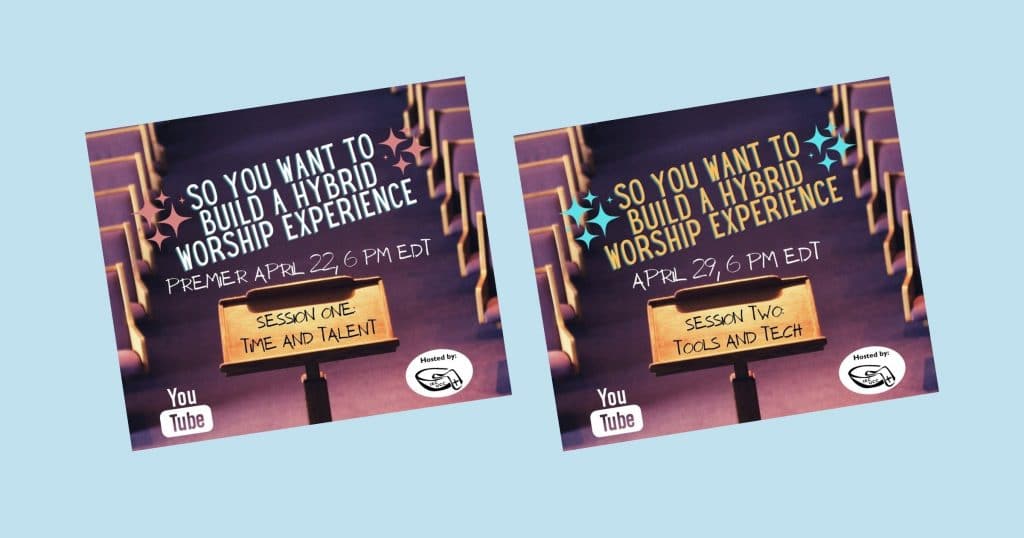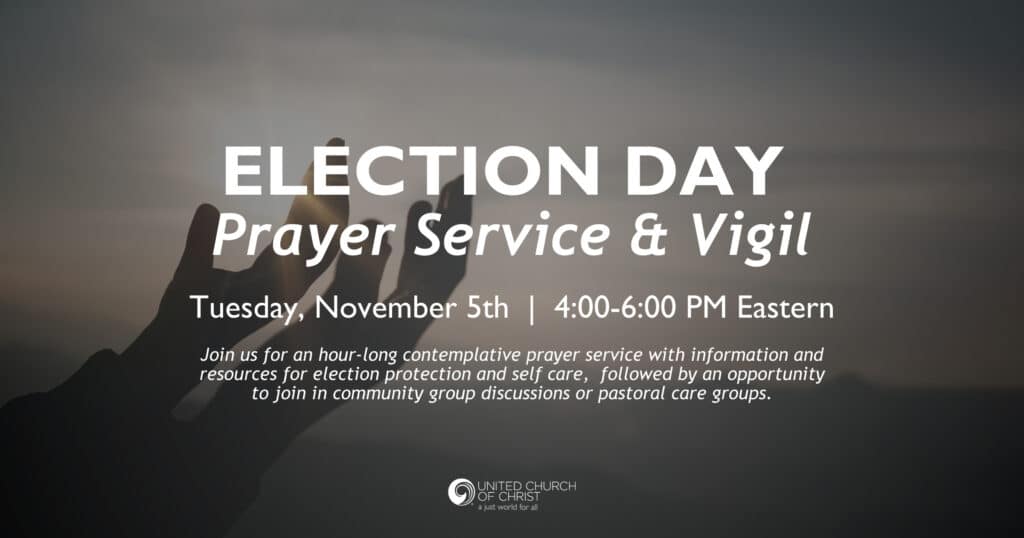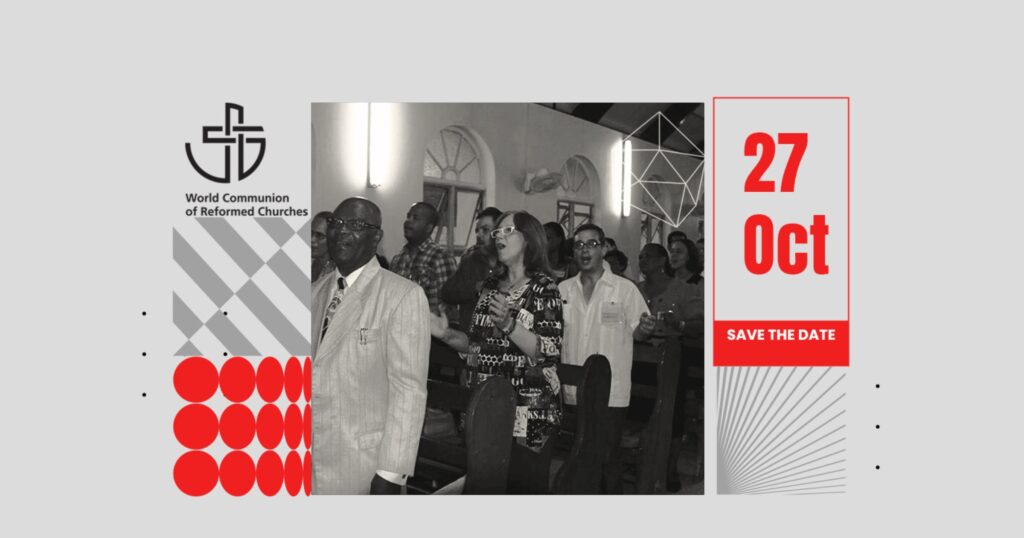Webinar shows churches how to stay online as they reunite in person
As COVID-19 wanes and your church regathers in person, stay online, too — even if you’re on a budget.
That was the advice of two ministers and a video expert in a pair of United Church of Christ webinars.
The Indiana-Kentucky Conference hosted “So You Want to Build a Hybrid Worship Experience” on Zoom and YouTube April 22 and 29. The discussion is available now for free on YouTube. The Conference is encouraging churches to share both parts widely across the UCC and beyond.
To be sure, the webinars touched on the technical side of going live from a sanctuary. They covered cameras, microphones, software, switchers, cables and online platforms — from the simple to the high-end.
But, just as important, they emphasized:
- Why it’s a good idea to blend in-person worship with an online component — permanently.
- How to form a team, make plans and pull them off affordably.
- The need to address “two congregations” at once: the people there in person and those at home. For many worship leaders, this requires a new consciousness — and takes practice.
‘How we best serve all’
Vaccines offer “glimmers of hope” that churches will meet in person again as the pandemic passes, Indiana-Kentucky Conference Minister Chad Abbott said. But churches wonder “how we best serve all of God’s people — those that are going to be in person and those that aren’t quite comfortable coming yet.”
“The church will never go back to ‘what once was’ prior to the pandemic.”
The Rev. Chad Abbott, Indiana-Kentucky Conference
“The church will never go back to ‘what once was’ prior to the pandemic,” Abbott said. “Most of us are aware that the worship experience has now been changed forever,” he said, because so many congregations now know how to gather online.
“We need to be present to that change with a sense of mission and clarity,” he said.
Forming a team
Getting that clarity from the start is key, because there are many ways to do hybrid worship, said Troy Vaupel. He owns a video production company and live-streams worship for Bethlehem UCC, Evansville, Ind., where he is a member.
“This is a ministry that’s going to grow.”
Troy Vaupel, Bethlehem UCC, Evansville, Ind.
As a first step, he recommended every congregation form a special team to focus on hybrid worship. Ideally it would include:
- The church’s senior minister
- Its elected leaders, so they’re in on conversations about goals and expense from the start
- “Tech-savvy” members
- An attorney familiar with copyright law, to be sure the church gets proper permission to stream and record music and images
It’s essential to think of hybrid worship as something that’s here to stay, Vaupel said. “It’s not just a notion of, well, we’re only doing this until the pandemic’s over and then everyone can be back under the church roof. This is a ministry that’s going to grow.”
Setting hybrid goals
Vaupel said the team should ask basic questions: “What do you want people to take from viewing your [worship] video? And … what do you want them to do after?” The latter might include visiting the church’s website, contacting a minister, signing up for a ministry, or, eventually, visiting in person. Answers to those questions will inform everything else, from worship planning to equipment purchases.
Worship is “not just for the people who are there, but for the people who are viewing at home.”
Troy Vaupel, Bethlehem UCC, Evansville, Ind.
And then, he said, it’s time to think about the structure of worship itself — knowing that a video feed is now part of it.
“Some of you may decide, out the gate, all we really want to do is just capture the essence of our service and maybe record our sermon or a message and just have that online,” Vaupel said. “That’s totally OK.” Others, he said, may want to go hybrid more aggressively from the start. They may want to build in new ways of interacting with online worshipers — live, via social media, for example. “That’s good too. But determine what that structure of worship’s going to be like, not just for the people who are there, but for the people who are viewing at home.”
‘Not super-wealthy, not super-big’
The Rev. Janna Meyers, pastor of St. John UCC, Cumberland, Ind., encouraged webinar viewers not to be intimidated. “You guys may have a church similar to mine, which is not super-wealthy, not super-big and not super-full of, like, loads of tech people,” she said. “But that does not mean that this cannot be your story.”
“We have somebody at every single worship service whose job it is to say hello to everyone who logs on.”
The Rev. Janna Meyers, St. John UCC, Cumberland, Ind.
That story, she said, started in March 2020, when St. John closed its building. It immediately went live on Facebook with worship, with nothing but Meyers’ smartphone. “At first it was just me shouting at the phone from across the sanctuary because I didn’t know how to turn the sound board on, and the tech guy – we weren’t going to ask him to come out of his house. We had just — literally, it was myself and the pianist. And it was a mess.”
A year later, things look much different, she said. St. John has been worshiping in person for seven weeks now and — thanks to a year’s learnings and equipment purchased with a grant — has kept streaming to Facebook Live. Connecting with remote viewers is a priority, because, as Meyers put it, “They’re my real church. They’re my real members. They’re just in a different place, and I want to welcome them in the same way I welcome everybody else.”
St. John has a team of “tech stewards” who take turns as digital ushers. “We have somebody at every single worship service whose job it is to say hello to everyone who logs on,” Meyers said. “So if you log on, we’ll ask you to say ‘hi’ in the chat, and then someone will write back to you by name.” Meyers herself is also on her phone during the service — and said her in-person congregation understands why. “I make a point of posting to the Facebook screen from the pulpit,” she said.
‘They were just surfing the internet’
Being online and in person at the same time can pay dividends — including newcomers. “Maybe because we’re an older church, smaller, you know, sort of half-rural, half-suburban, we don’t normally get a lot of visitors,” Meyers said. “You may not either. But we have had six different people join church since we’ve come back, in seven weeks, because they all started coming online during the pandemic.
“We’re not doing this to get through the pandemic. We’re doing this to have a new form of evangelism, a new form of reaching out.”
The Rev. Janna Meyers, St. John UCC, Cumberland, Ind.
“They were just surfing the internet and one of their friends was watching, so they clicked in to watch. They’ve all come to church and said, ‘Hey, it’s our first Sunday here. … But we’ve been online for three months, we’ve been online for six months, we’ve been online with you since March.’
“That has been a really good reminder of why we’re doing this. We’re not doing this to get through the pandemic. We’re doing this to have a new form of evangelism, a new form of reaching out, a new form of connecting with our community and reminding them that we’re here whether it’s a pandemic or not.”
‘Take baby steps’
Vaupel went into detail on camera and equipment options. He offered specific advice, such as streaming through an ethernet cable instead of relying on wifi. And he stressed that — what with hardware available in a range of prices and software available free — “there is technology to do it on a low budget.”
“It’s the new way to hold church.”
Troy Vaupel, Bethlehem UCC, Evansville, Ind.
“I encourage everyone, take baby steps,” Vaupel said. “Have the big plan, but allow yourself to do it in increments, so that way it’s successful as you build confidence.”
And he again urged churches to embrace hybrid worship as a new, permanent ministry emerging from a tragic, temporary pandemic. “This is the beginning of something that’s going to last forever,” he said. “It’s the new way to hold church. And we have to remember that that’s a good thing.”
Related News
UCC to offer Election Day Prayer Service and Vigil
On Election Day, Nov. 5, join the Rev. Karen Georgia A. Thompson together with United Church...
Read MoreGoing beyond the blessing: Churches emulate St. Francis’ care for animals
https://www.youtube.com/watch?v=lu3LYwhLxCo UCC News presents a video news story on the...
Read MoreUCC leaders invite all to global celebration of Reformation Sunday
This Reformation Sunday, leaders from the United Church of Christ will participate in a global...
Read More


